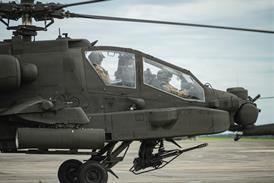FlightGlobal is the global aviation community’s primary source of news, data, insight, knowledge and expertise. We provide news, data, analytics and advisory services to connect the aviation community globally and help organisations shape their business strategies, identify new opportunities and make better decisions faster.
Columbia Helicopters sets out standard for civil version of CH-47D Chinook

Columbia Helicopters is looking to capitalise on growing demand for commercial heavy-lift rotorcraft for firefighting and other utility missions as it pushes ahead with a new military-to-civil conversion development for the Boeing CH-47 Chinook.
Keep reading this article by becoming a FlightGlobal member now
PLEASE REGISTER FOR FREE OR SIGN IN TO CONTINUE READING

You have reached your limit of free articles for this period. Register for a FREE account to read this article and benefit from:
- Increased access to online news and in-depth articles from:
- FlightGlobal Premium covering the global aviation industry
- Airline Business providing insight for business leaders
- Weekly newsletters on topics across the industry





















